Key takeaways
- The Portland Writers Community is a supportive and diverse environment that encourages connections among writers of varying experience levels.
- Key events like Wordstock Festival not only showcase established authors but also nurture emerging talent through workshops and personal interactions.
- Preparation for meetings with authors—such as researching their work and preparing questions—can enhance the experience and facilitate meaningful conversations.
- Building local writing connections requires genuine curiosity, patience, and frequent participation in community events to foster familiarity and collaboration.
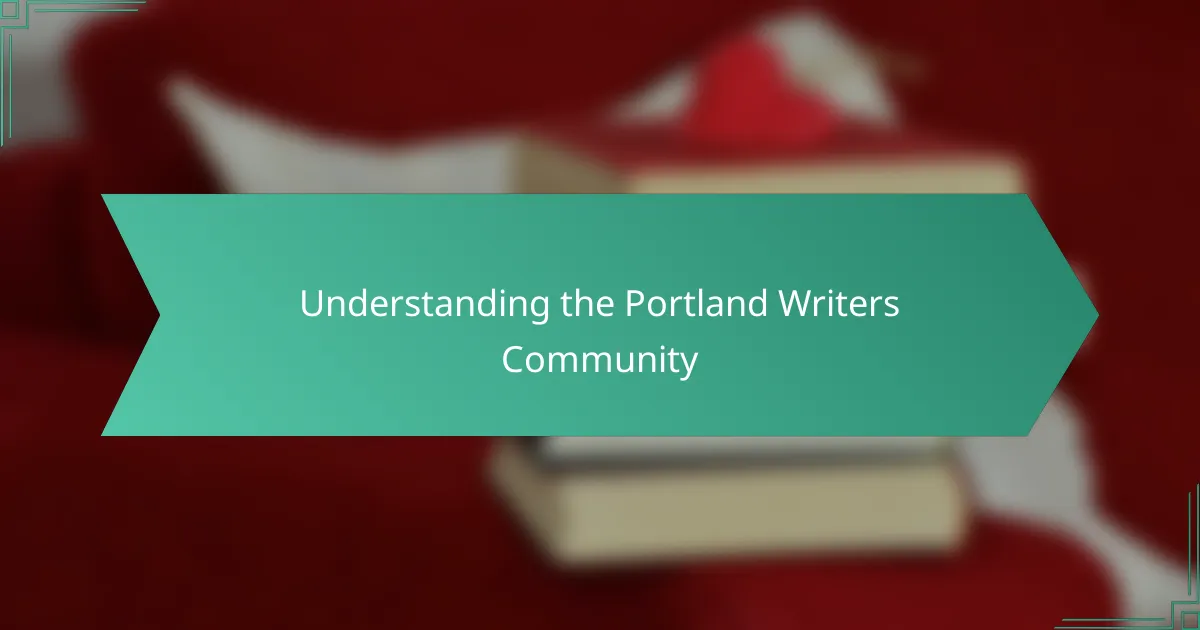
Understanding the Portland Writers Community
The Portland Writers Community has always struck me as a vibrant tapestry of voices, each bringing something unique to the table. Have you ever wondered what it feels like to be part of a place where creativity flows so freely? It’s more than just a network—it’s a supportive space where writers genuinely connect and grow together.
From my experience, this community is incredibly welcoming, whether you’re a seasoned author or just starting out. I remember my first workshop here; the encouragement I received was both humbling and energizing. It’s that blend of camaraderie and inspiration that makes Portland’s literary scene so special.
What really stands out to me is how the community embraces diversity in style and background. You’ll find poets, novelists, essayists, and even storytellers sharing ideas and challenges. It’s this rich mix that keeps the conversations lively and the creative sparks flying.
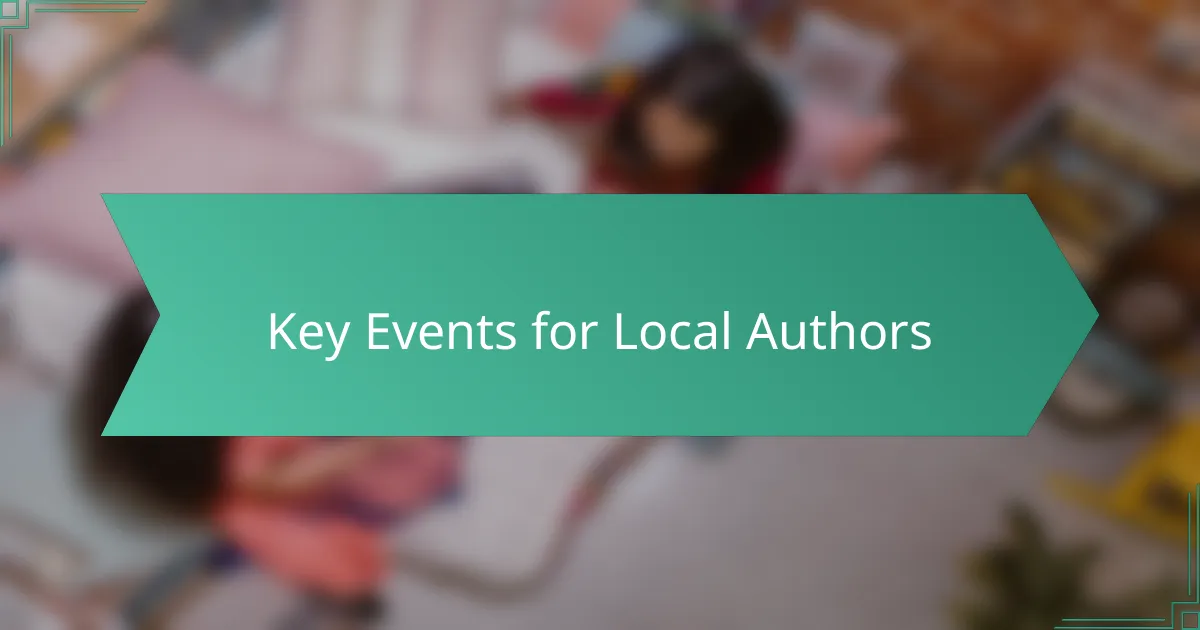
Key Events for Local Authors
One of the things I’ve found most exciting about Portland’s literary scene are the key events designed specifically for local authors. Have you ever attended a book fair or panel where you suddenly realize you’re surrounded by storytellers who live and breathe the same struggles and triumphs? These moments create an electric buzz that’s hard to describe but impossible to forget.
At Wordstock, for example, I was struck by how these events go beyond just showcasing books. They offer workshops, readings, and intimate Q&A sessions that make the whole experience deeply personal. I still recall chatting with an emerging poet in a small circle, where the energy was so encouraging it felt like we were all helping each other shape our futures.
What truly makes these events memorable, in my experience, is the way they balance professionalism with warmth. You get to network with industry professionals one minute and share a laugh with fellow authors the next. It’s this interplay that transforms simple gatherings into milestones on any writer’s journey.
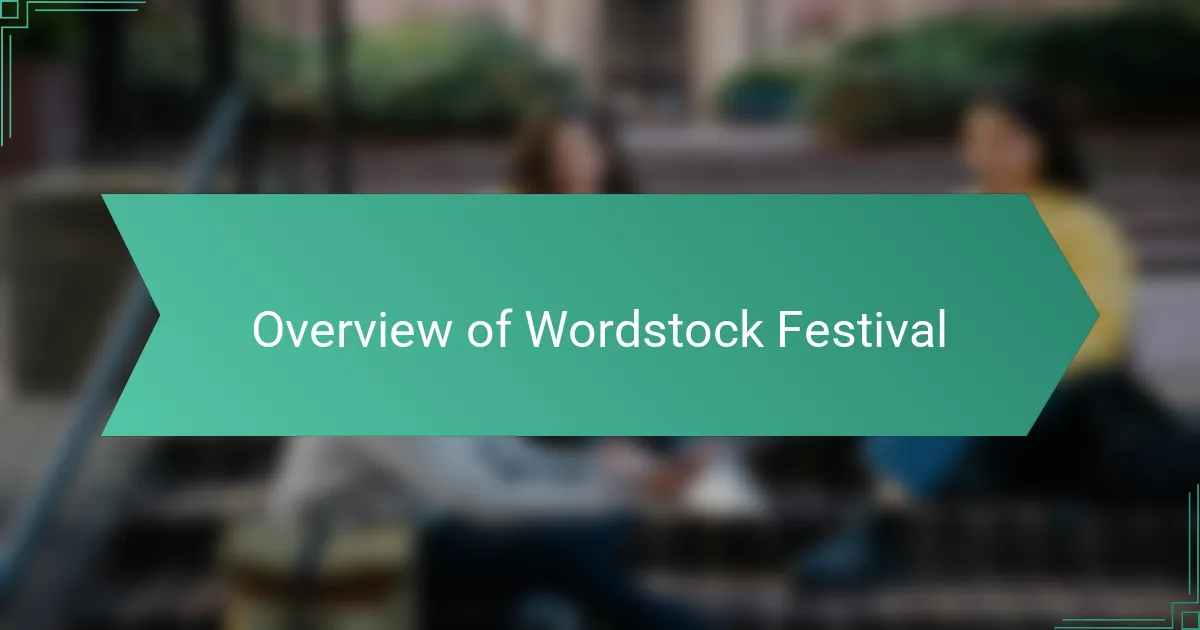
Overview of Wordstock Festival
Wordstock Festival feels like a literary heartbeat for Portland, drawing readers and writers into a shared celebration of storytelling. Have you ever stepped into a space where books seem to come alive? That’s exactly the vibe here—an energizing mix of book signings, author talks, and panels that invite you into the worlds created by local voices.
From what I’ve experienced, the festival isn’t just about showcasing established names; it actively nurtures emerging talent through workshops and intimate sessions. I remember sitting in a cozy room, listening to a debut novelist describe their journey, and feeling inspired by how accessible the community felt—like you could truly join in and grow alongside these authors.
What strikes me most about Wordstock is its ability to connect people on a personal level amid the buzz of literary excitement. It’s not just a festival; it’s a place where conversations flow easily, where you’re as likely to exchange writing tips as to share a laugh over a favorite book. Have you ever been somewhere that felt both professionally enriching and warmly welcoming at once? That’s Wordstock for you.
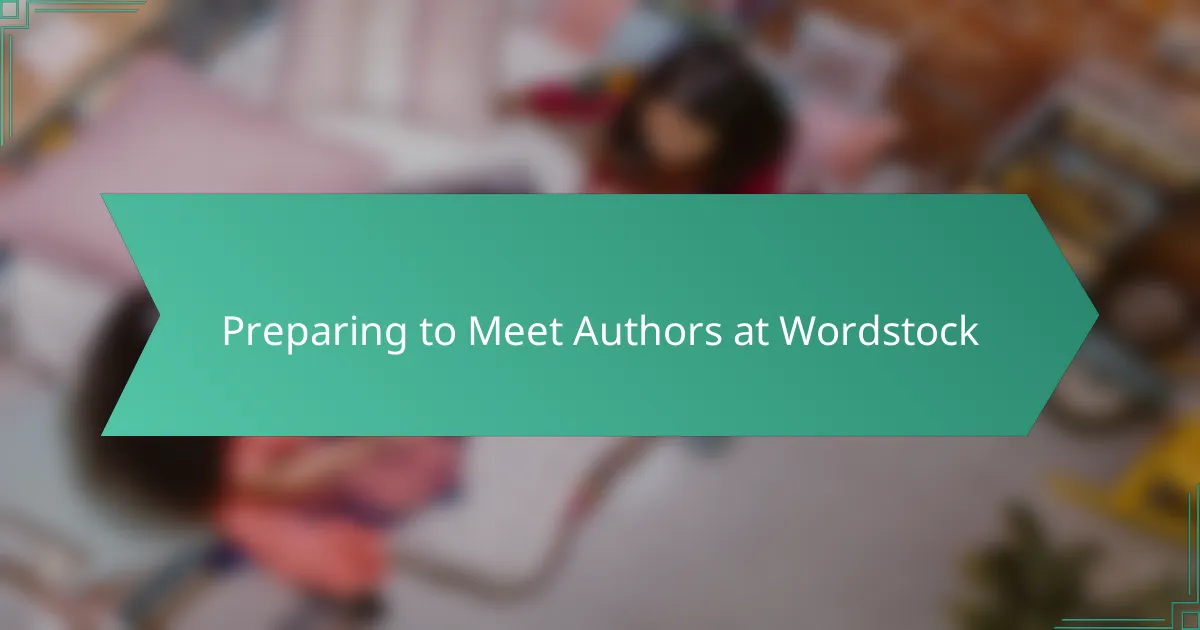
Preparing to Meet Authors at Wordstock
Preparing to meet authors at Wordstock felt like gearing up for a conversation I’d been eager to have for ages. I found that doing a bit of homework beforehand—reading a few books by the authors I hoped to meet—made those moments feel more meaningful. Have you ever approached someone knowing just a little about their work? It changes the dynamic from awkward small talk to genuine connection.
I also made a habit of jotting down a few questions or thoughts inspired by their writing. It might sound formal, but from my experience, having those little prompts helped ease the nerves and allowed the conversation to flow naturally. Plus, it showed the authors that I truly cared about their craft, which always seemed to open doors to deeper dialogue.
Something else I learned was to bring an open mind and a patient spirit. Wordstock can be bustling, and lines can get long, but I found that waiting patiently often led to unexpected chats—not just with authors, but with fellow visitors. Those in-between moments sometimes became the most memorable parts of the experience. Have you noticed how sometimes the best stories happen while you’re just waiting?
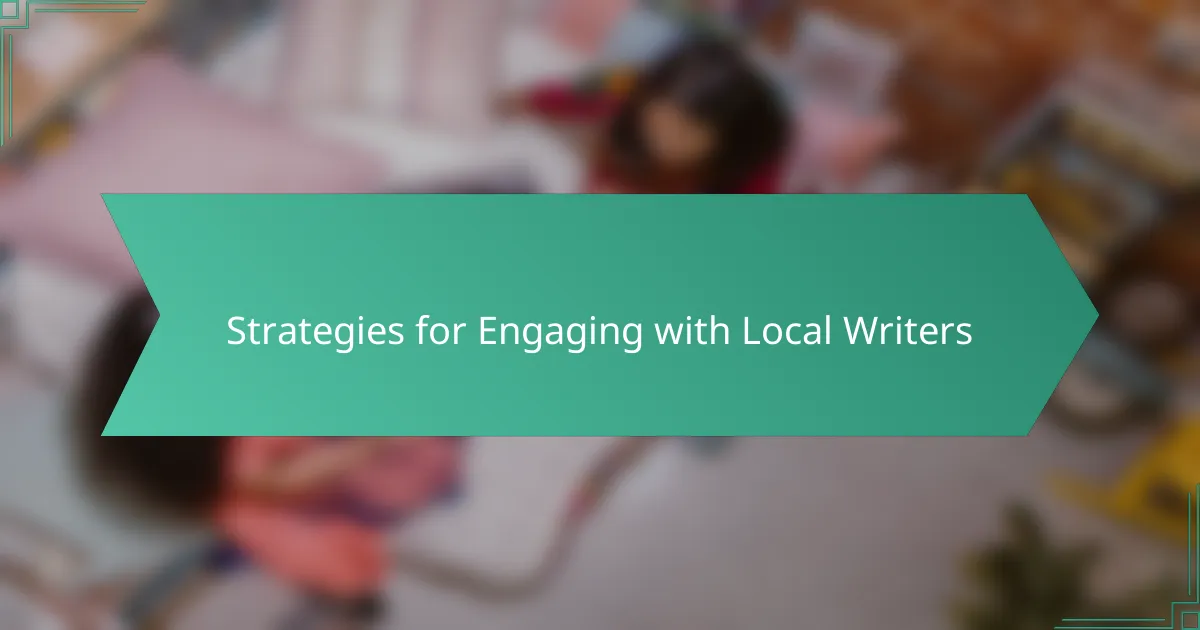
Strategies for Engaging with Local Writers
Engaging with local writers, I’ve realized, starts with genuine curiosity. Have you ever asked an author about the story behind their favorite piece? Those moments spark authentic conversations that go beyond surface-level chatter. It’s surprising how a simple question can break the ice and open up a whole world of shared experiences.
I also found that attending smaller workshops or panel discussions at events like Wordstock creates the perfect space for meaningful interaction. When you’re in a cozy group, it’s easier to connect and exchange ideas without the pressure of a big crowd. One time, I struck up a conversation with a novelist after a workshop, and that casual chat led to an ongoing mentorship that still inspires me today.
Patience and openness are key, too. Sometimes I’ve waited in long lines just to say a quick hello, but those pauses turned into unexpected moments of community—chatting with other attendees or the authors themselves about writing struggles and successes. Have you noticed how these in-between moments often become the heart of the experience? It’s in those pauses that real connections often take root.
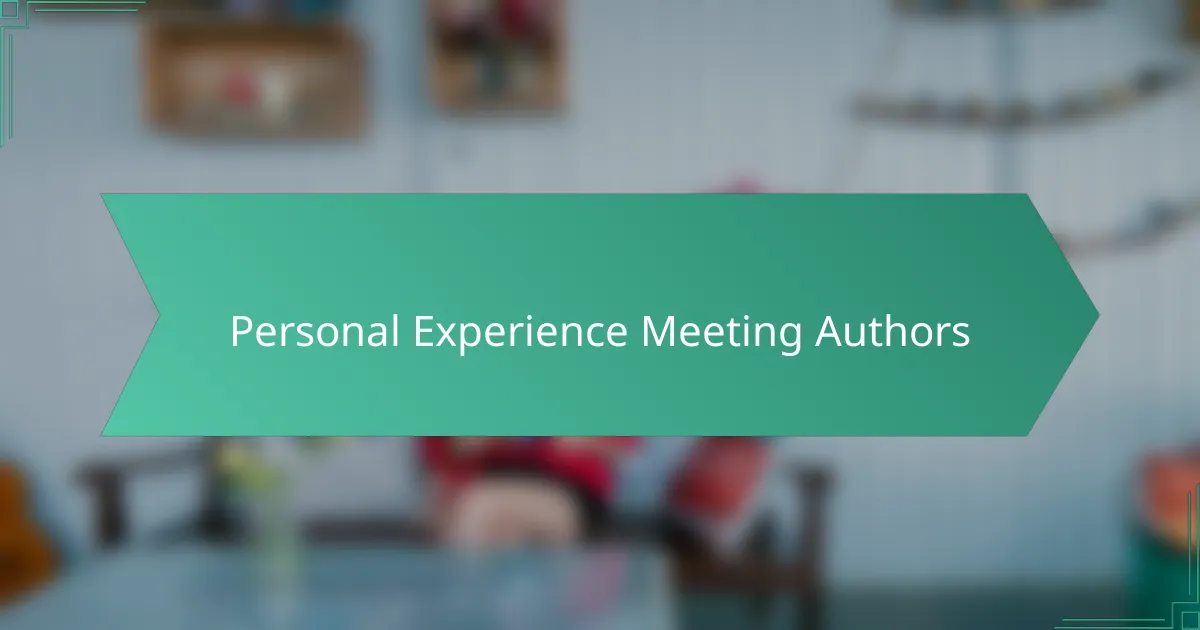
Personal Experience Meeting Authors
Meeting local authors at Wordstock was genuinely exciting for me. I still remember the moment I nervously approached one of my favorite writers, heart pounding, only to find they were incredibly approachable and eager to talk about their craft. Have you ever experienced that mix of awe and relief when someone you admire turns out to be so down-to-earth?
One encounter that stands out happened during a panel when an author shared a personal struggle behind their latest book. Hearing that vulnerability made me feel closer to their work in a way I hadn’t anticipated. It made me think—how often do we overlook the human stories behind these pages? That moment lingered with me long after the event ended.
Sometimes, the most memorable interactions happened in the simplest ways. I recall standing in line for a book signing, exchanging smiles with an author as they signed my copy, and feeling a quiet connection that didn’t need words. Isn’t it fascinating how those brief, sincere moments can leave such a lasting impression?
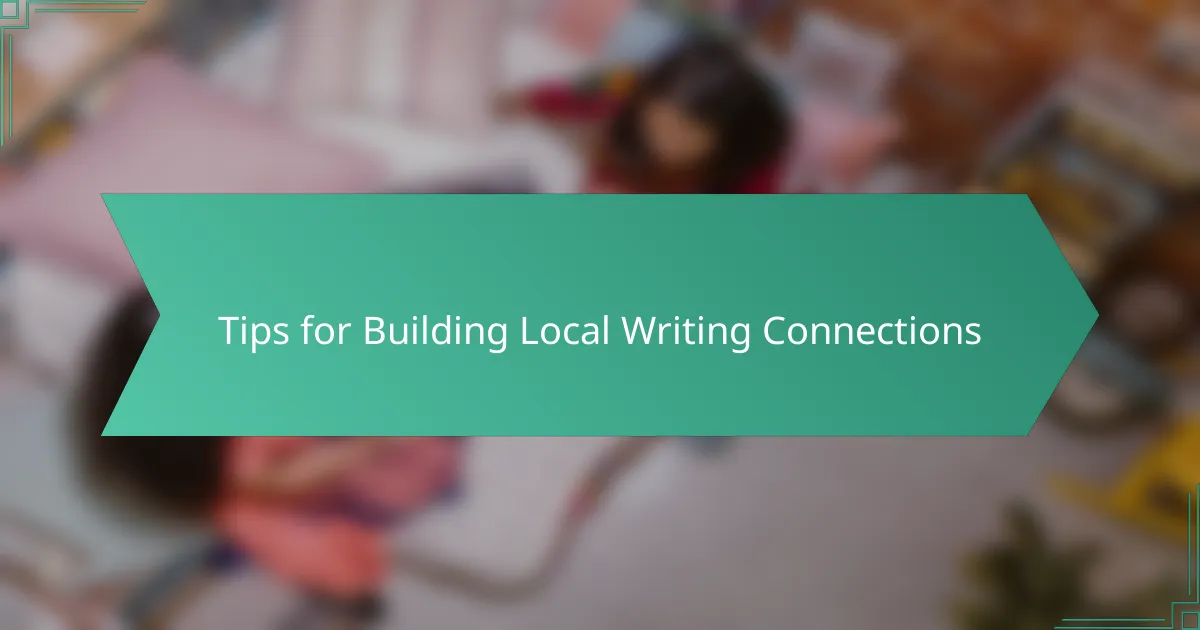
Tips for Building Local Writing Connections
Building local writing connections, I believe, begins with showing genuine interest. Have you ever noticed how asking a thoughtful question about someone’s work instantly breaks the ice? From my experience, it signals respect and opens up conversations that feel more like exchanges between friends than formal networking.
I’ve also found that frequenting local writing spots—be it workshops, readings, or casual meet-ups—creates a rhythm of familiarity. When you see the same faces over time, you start to feel part of something bigger. One time, a simple “hello” at a café led to a writing group invite that completely changed my creative routine.
Patience is something I had to learn along the way. At events like Wordstock, the excitement and crowds can be overwhelming. But waiting in line or lingering after a talk often turned into unexpected moments of connection. Have you ever found that some of the best conversations happen in those in-between spaces? I certainly have, and it’s those pauses that make the local writing community feel truly alive.